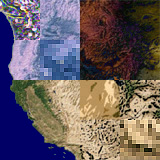A
Digital Broadside
"After
9/11: Wiring Networks for Security and Liberty"
As
part of the English Department's Transcriptions Project,
directed by my colleague Alan Liu, I've joined with other
faculty and grad students in teaching our students to use
their core abilities to read and write so as to build web-pages
that link their work to the resources and communities available
through the World Wide Web. The events of 9/11 have dealt
a powerful shock to this project. It is forcing us to ask
difficult new questions about the utility and dangers of
intelligent networks and the global communication of information.
My talk this morning will seek to do three things: first,
understand how the attacks on 9/11, and the subsequent anthrax
attacks, have succeeded in compromising our networks; second,
I will end this talk by arguing that 9/11 should not mean
that we reconfigure American networks by bartering away
our liberty in the name of security. Instead, in the wake
of 9/11, we should think through ways to make our networks
more secure by making them more robust, more extensive,
and more intelligent.
The
first networks compromised by 9/11 were the television networks
that brought us the event. The affective power of the WTC
disaster arises from the particular kind of concentrated
televisual spectacle it produced. The first strike against
the WTC tower #1 brings the cameras of news media into play
around both towers, so that live coverage can capture images
of a Boeing 767 [check] striking WTC 2. The second strike
changes the meaning of the event.

